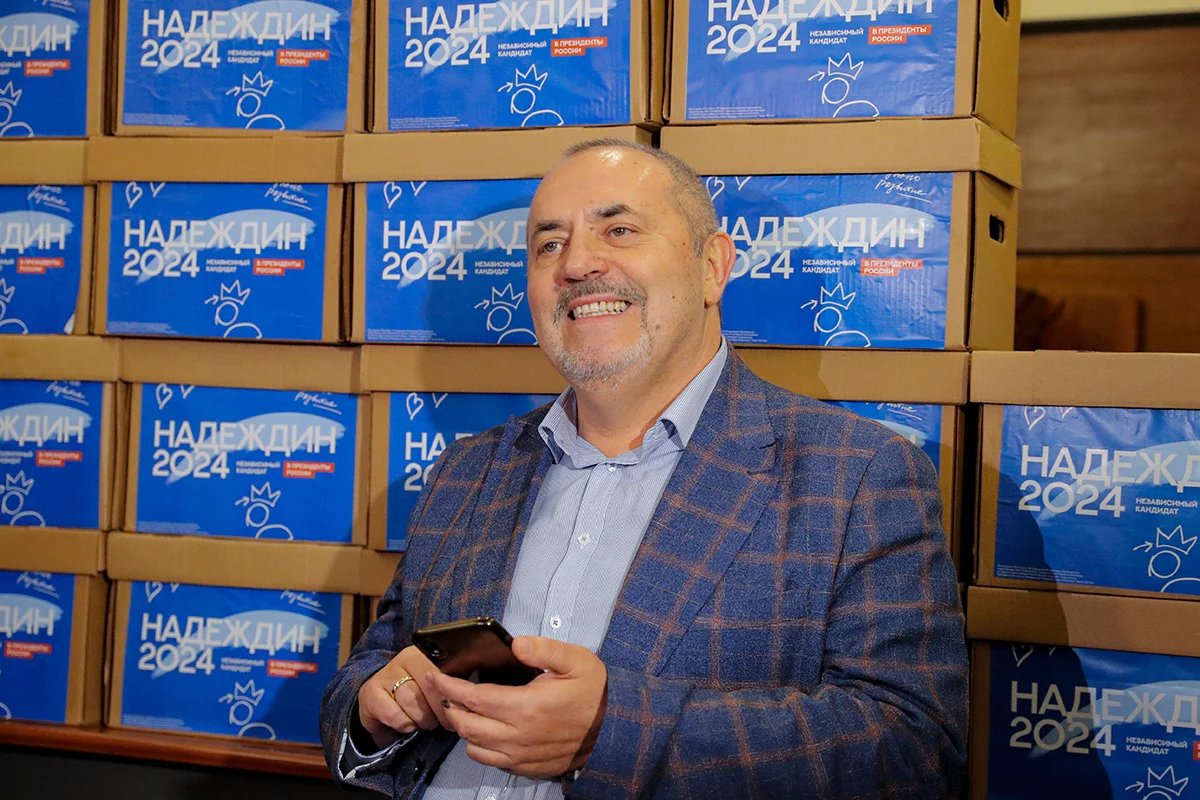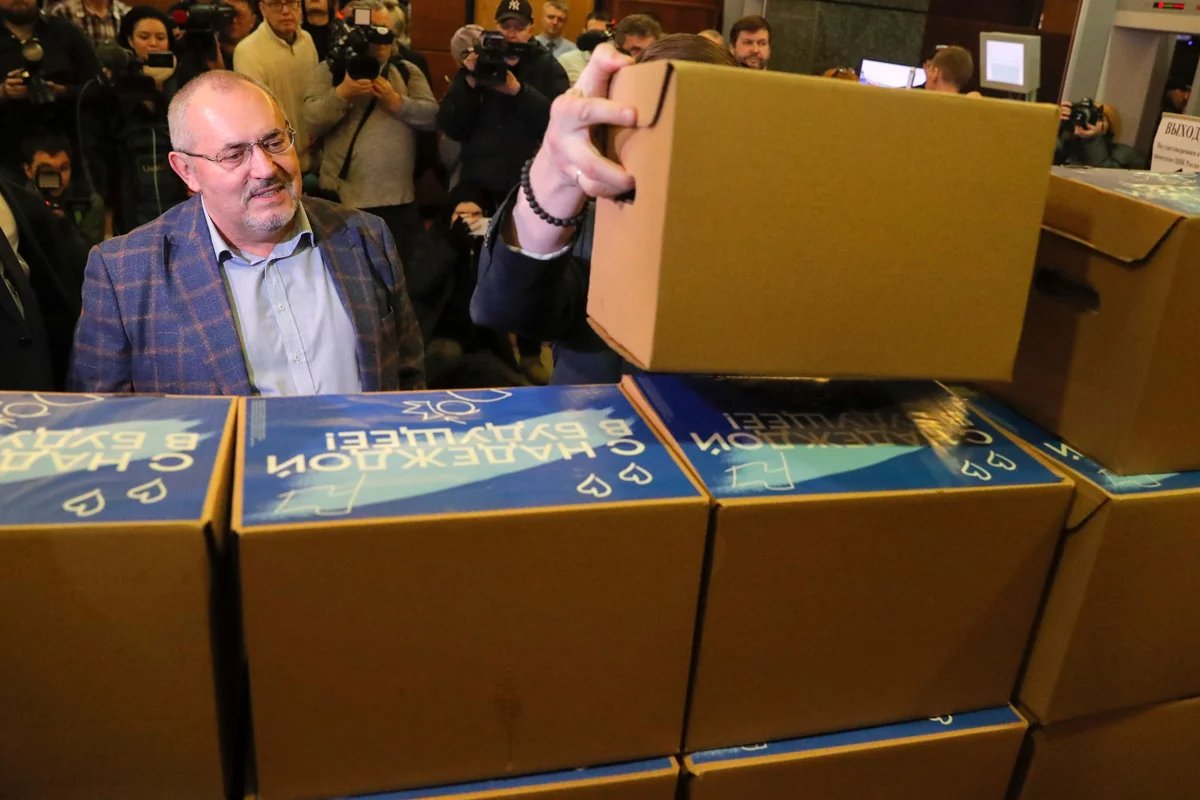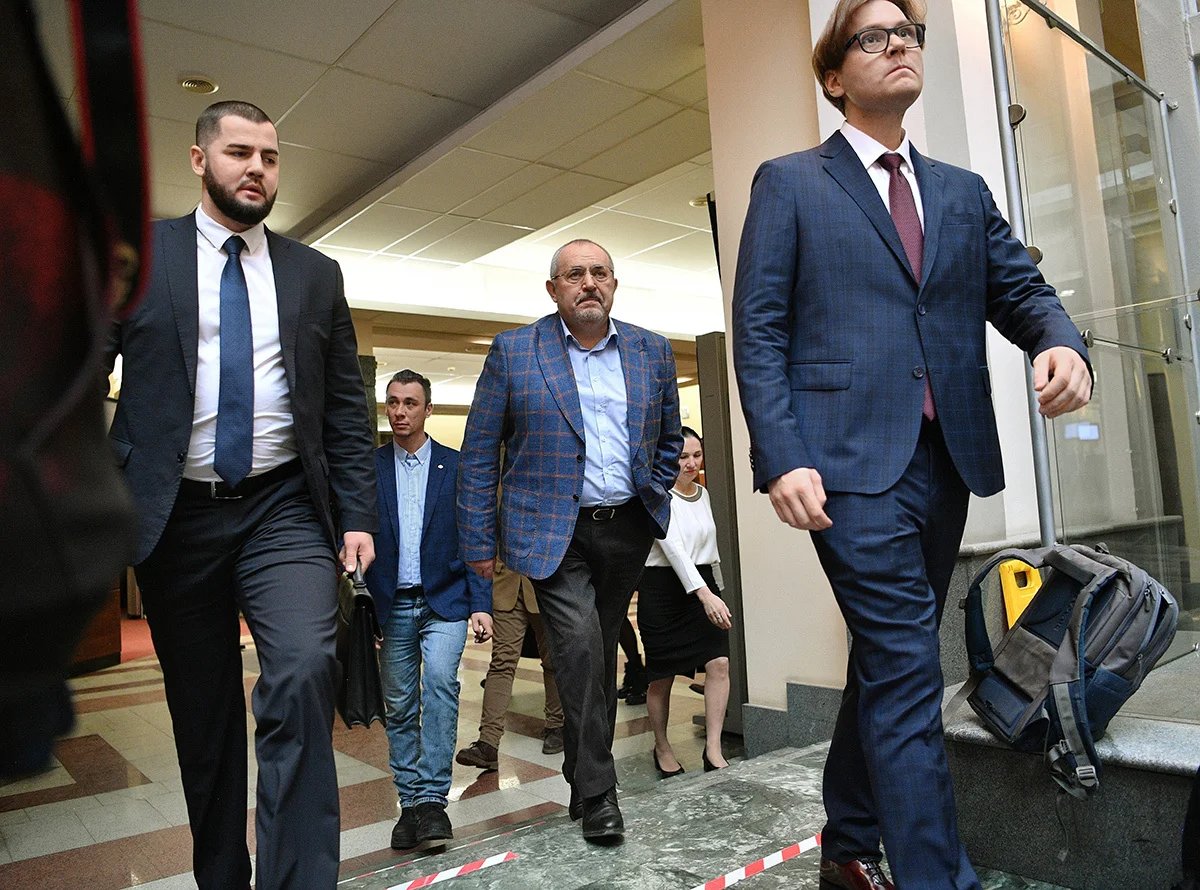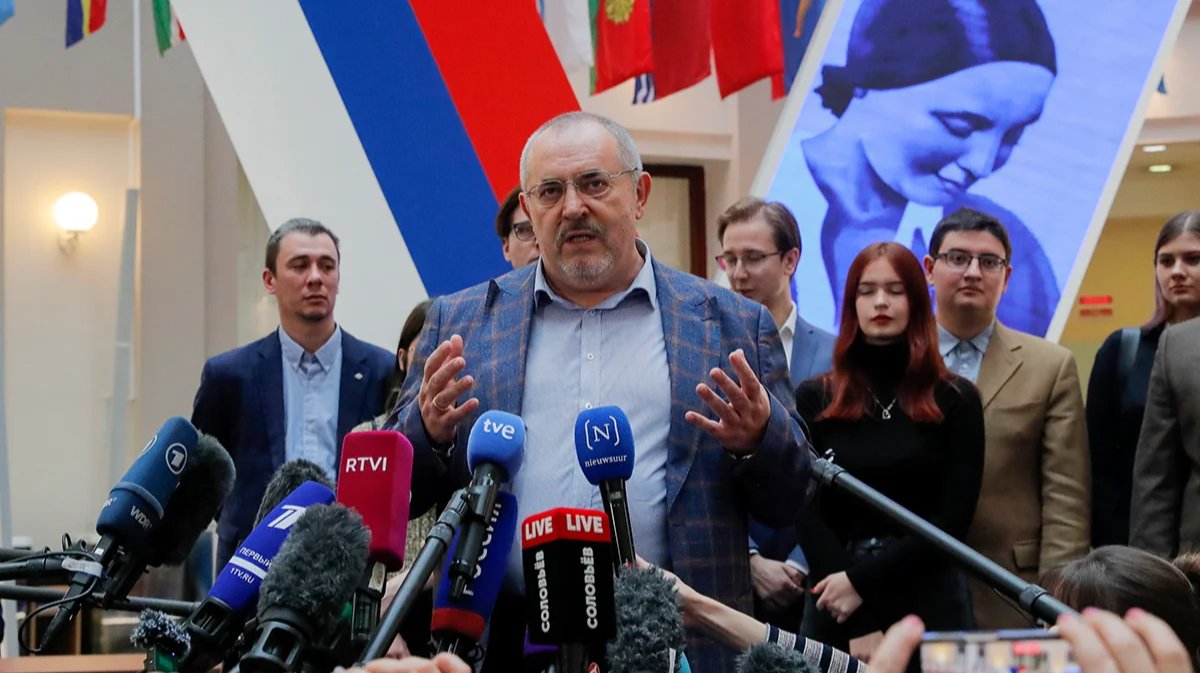It remains unclear whether the Central Election Commission (CEC) will register the unlikely anti-war presidential hopeful Boris Nadezhdin to run in March’s presidential election, though his summons to appear before the commission on Monday over what it called “deficiencies” in the 105,000 signatures of support he submitted with his candidacy application doesn’t bode well.
Opinion polls have indicated varying levels of support for Nadezhdin among Russians. One study ordered by his campaign team indicated that 10% of voters would cast their ballots for Nadezhdin in March’s election, placing him second behind veteran incumbent Vladimir Putin. Another poll by the independent Levada Centre indicated that just 4% of voters would back Nadezhdin if the election took place today, however.
Novaya Gazeta Kazakhstan’s Yulia Latynina spoke with Nadezhdin about his chances of being registered as a candidate, his plans for peace with Ukraine, and his vision for a post-Putin Russia. Their conversation has been edited and adapted for international readers with permission from Novaya Kazakhstan.
YL: Do you think your candidacy in the presidential election will be accepted?
BN: I announced that I was going to run at the very CEC meeting where they disqualified me from running for governor of the Moscow region. I told them: “If you won’t let me run for governor, I’ll run for president.” Everyone told me I was just messing about and that they wouldn’t let me run. I’d already written a manifesto that outlined my categoric opposition to Putin’s politics and advocated ending the “special military operation.” I was told that no party would nominate me with a platform like that — they’d all be too scared.
Every step of the way, I was told I wouldn’t succeed. Nobody believed we would reach this stage, that people across the country would be queueing up to support my nomination. Nobody believed we would raise the necessary money to open offices, and now everyone is saying that I won’t be registered.
I don’t see how I can’t be registered. They may nitpick over some formalities, but the whole country has seen the crowds of people standing in the cold to support me.
Have you seen queues of people standing in the cold to give their support to Putin? Nobody has.
YL: Who is bankrolling your campaign?
BN: My campaign is the first in Russian history not to rely on government funds. … There’s never been a presidential campaign that was funded by tens of thousands of Russians rather than by the state or oligarchs. People are donating every day. It’s all entirely within the law, in accordance with CEC guidelines. We’ve already collected over 30 million rubles [€305,000] for this election. It’s just incredible!

Nadezhdin poses with boxes of signatures of support at the CEC on Wednesday. Photo: Maksim Shipenkov / EPA-EFE.
YL: What’s your platform?
BN: To make Russia peaceful and free. To make people in Russia stop being afraid to speak out against the authorities or to say anything negative about the country, to make them unafraid to call for peace and to ensure they’re not arrested for doing so. Under Putin, the state’s priorities are military- and police-focused. There’s huge spending on defence and the police — almost 11 trillion rubles [€112 billion] this year. People have small pensions and low salaries, and spending on education and healthcare is low. These need to be increased. Our priorities should be different.
YL: Many of your supporters see you as the candidate who’ll end the “special military operation.” How exactly do you plan to do that?
BN: First, I’ll publicly propose to the Ukrainian leadership and the coalition that supports Ukraine that an immediate ceasefire is declared and that peace talks begin. Second, I’ll end mobilisation in Russia. The peace talks will be a long and difficult process, so I’ll devote my first term in office to them, though that will be four years rather than six, of course. Russia’s problems began when Putin abolished the two-term presidential limit and raised the term to six years.
YL: What terms do you propose peace on?
BN: Right now, Putin’s Russia believes it can win militarily. And Zelensky’s Ukraine believes it can retake Crimea militarily. Both are absolutely impossible. You can see for yourself that the frontline has hardly changed over the past year.
The conflict has reached a stage in which a decisive victory for either side is impossible. There is no military solution. All conflicts like this end in negotiations.
Negotiations will be tough, and there are many questions. Who will rebuild everything? Where should an internationally recognised border be?
YL: Should the border be where the frontline is now?
BN: The border should be where we agree it to be … and in full accordance with Russia’s Constitution. The most important thing is where the people who live in these areas, or used to, want to live. … My personal opinion about Crimea and Kherson isn’t that important. What matters is the opinion of those who live there. It’s a long story. Decades will have to pass. And it will take more than just the efforts of the president of Russia.
We need the West to stop seeing us as the Russia of Nicholas I, Stalin or Putin. We need them to see us as the Russia of Nadezhdin, Tolstoy and Dostoevsky.
We’re not as awful as we’re being depicted now … overall Russia has peacefully coexisted with Europe since Peter the Great. Sure, there were conflicts. But who hasn’t had those?
YL: Who does Crimea belong to?
BN: Crimea belongs to the Crimeans. Ask the people who live there and they’ll tell you who Crimea belongs to.

Nadezhdin delivering signatures of support to the CEC on Wednesday. Photo: Maksim Shipenkov / EPA-EFE
YL: Some say the Kremlin needs you to legitimise the elections. What do you think of that?
BN: I’m completely independent. I think I just tapped into something the public wanted. In my manifesto, I wrote that I oppose Putin’s politics, that I support a peaceful and free Russia and an end to the war. For me, the worst part is that Putin has dragged the country back into the same rut we were trying to escape all these years. The rut of militarisation, authoritarianism, and isolation was fatal for the Russian Empire, and Putin has dragged Russia back there. I’ve been saying that from the start. No politician approved by the Kremlin could say things like that. I tapped into a demand, I felt that energy, and it responded.
YL: Over 100,000 people have now signed up to support your candidacy. Aren’t you afraid the authorities will come after them?
BN: Those people haven’t broken any laws. We know that in this situation, they could come up with all sorts of things, but I can’t imagine that they will in this case. Moreover, the Russian Constitution states that elections are free … I don’t see any reasonable way, even in an authoritarian regime, to start punishing people for activities provided for by legislation.

Boris Nadezhdin leaves the CEC with members of his team on Wednesday. Photo: Igor Ivanko / Sipa USA / Vida Press
YL: Many people say that the fact you got so many signatures of support will demonstrate to the elites that not everyone supports Putin, thereby increasing the chance of change. How would you respond to that theory?
BN: Most of these Russian officials dream of a return to normal life and an end to this nightmare … if you were to offer them the chance to wave a magic wand and return to 2021, they would all take it.
YL: The most important thing for you is a ceasefire within the current borders, then negotiations, the release of political prisoners, and normal relations with the existing elite. Did I miss anything important?
BN: The most important thing is that, through joint efforts, I want to make Russia a peaceful and free country. A country that you and hundreds of thousands of others who left it can return to without fear. So that Russian citizens can travel around the world easily, preferably without visas. I’m not sure I can achieve that in my first term, but it will become easier over time.
Join us in rebuilding Novaya Gazeta Europe
The Russian government has banned independent media. We were forced to leave our country in order to keep doing our job, telling our readers about what is going on Russia, Ukraine and Europe.
We will continue fighting against warfare and dictatorship. We believe that freedom of speech is the most efficient antidote against tyranny. Support us financially to help us fight for peace and freedom.
By clicking the Support button, you agree to the processing of your personal data.
To cancel a regular donation, please write to [email protected]

